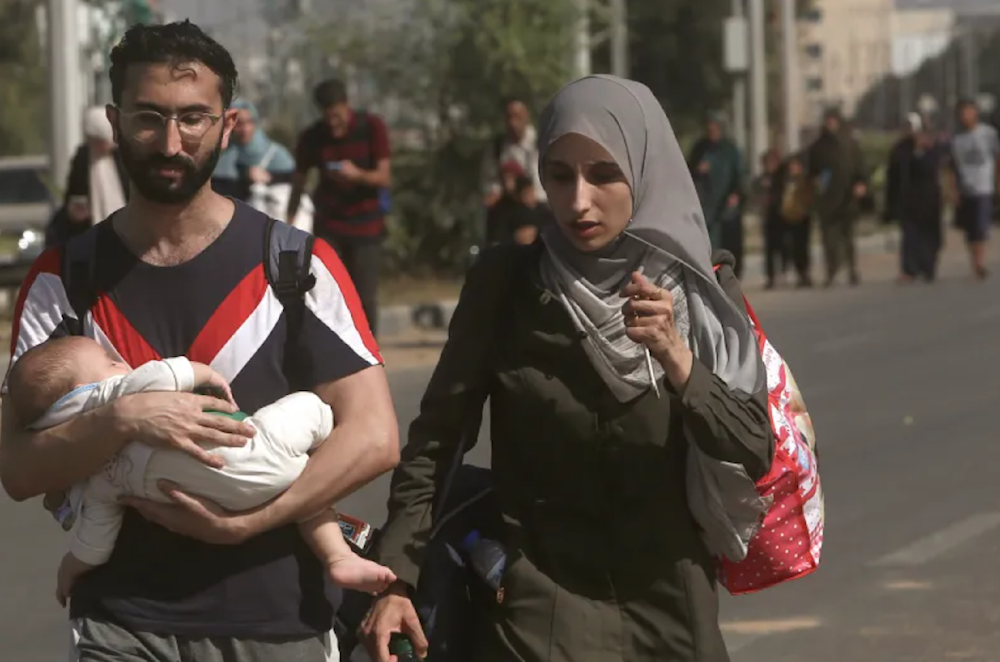Netanyahu mulling besieging Hamas, forcing out Northern Gaza residents
The proposal, developed by a group of retired Israeli military generals, aims to force Hamas into surrendering.
-

Palestinians flee Gaza City to the southern Gaza Strip on Salah al-Din street in al-Bureij, on November 7, 2023. (AP)
Israeli Prime Minister Benjamin Netanyahu is contemplating a plan to force Palestinians out of northern Gaza to besiege the Palestinian Resistance movement Hamas and attempt to pressure the release of Israeli captives, CNN reported.
Estimates suggest that hundreds of thousands of Palestinians remain in that area, as many have resisted displacement amid ongoing airstrikes in Gaza.
The proposal, developed by a group of retired Israeli military generals, aims to force Hamas into surrendering.
Netanyahu reportedly expressed that the plan “makes a lot of sense” during a recent closed-door meeting with the Knesset’s Foreign Affairs and Defense Committee.
Giora Eiland, a former Israeli military officer supporting the initiative, said in a video broadcast online earlier this month that Palestinians who leave will receive food and water but that "in a week the entire territory of the northern Gaza Strip will become military territory, and this military territory as far as we are concerned, no supplies will enter it."
In a letter acquired by CNN, 27 Knesset members, including three serving ministers, urged the Israeli administration to accept the plan.
Eiland said in the video that "Sinwar is really not stressed," adding that the 300,000 residents in northern Gaza should be informed that it is not merely suggested they leave the northern part of the strip but rather "we are ordering you to leave the northern Gaza Strip."
The Commanders and Reserve Fighters Forum, a collection of retired and reservist commanders, has supported the idea "to bring about a de facto change in the war situation."
One of the plan's supporters told CNN that it does not address the question of whether Palestinians may ever return to northern Gaza.
The generals claim to have submitted the idea to the Israeli cabinet "several times".
The Prime Minister's Office declined to confirm to CNN if the meetings occurred.
The idea was presented to the Knesset's "Foreign Affairs and Defense Committee." Meirav Cohen, a Knesset member from the Yesh Atid party, criticized the administration for letting relief trucks into Gaza.
"The only threat that they are facing is obesity," she remarked at a meeting with the pressure group, which included Giora Eiland.
Cohen's obscene remarks come as the United Nations Relief and Works Agency for Palestine Refugees in the Near East (UNRWA) stated on Thursday that, on average, Palestinians in the blockaded territory are receiving just one meal every other day.
In a letter to Netanyahu and his colleague ministers, 27 of the 120 Knesset members expressed concern that "we have not yet reached the finish line in any of the goals defined by the War Cabinet."
They urge the government to carry out Eiland's proposal in northern Gaza and speculate that once this happens, it will be possible to implement the same plan in other parts of Gaza
Israeli government chose revenge over Gaza captives: Ex-Mossad chief
Israeli Prime Minister Benjamin Netanyahu's government prioritized revenge over the lives of captives held by Hamas in the Gaza Strip, pointed out former Mossad chief Tamir Pardo, Anadolu Agency reported.
Pardo, who led Mossad from 2011 to 2016, indicated in an interview for the Israeli media outlet Srugim, that the Israeli government should have accepted Hamas' offer for a prisoner exchange on October 8, 2023, "Israel, however, chose revenge."
He emphasized that Netanyahu's government already knew that the captives could not all be retrieved through a military offensive and could be killed in Israeli airstrikes on Gaza.
"However, the government was not bothered. It rather launched a campaign to convince the public of false narrative as an absolute victory," the ex-Mossad chief stressed.
Pardo asserted that rather than seeking revenge, the Israeli government should have first secured a deal for the captives' release and then focused on military objectives.
His remarks echoed those of Israeli Chief of Staff Herzi Halevi, who told the families of captive soldiers, both living and dead, during a tense meeting on Saturday evening that the effort to secure the release of Israeli captives is growing progressively more challenging and complicated as time goes on, according to Israeli media.
Halevi stressed that the Israeli military is encountering substantial challenges in collecting intelligence on Israeli captives held in the Gaza Strip.
He added that he was “not sure there will be anyone to bring home” if a deal is not reached soon.
Talks regarding a ceasefire and a prisoner exchange deal have been stalled as the Israeli war on the Gaza Strip continues.
The Philadelphi Corridor on the border between Gaza and Egypt and details on the release of Israeli captives held by Hamas and the Palestinian detainees remain the main sticking points to a deal.
Netanyahu is adamant about not withdrawing from the Philadelphi Corridor during the first phase of a potential agreement, intending to postpone the withdrawal to the second phase, while Hamas insists on a first-phase withdrawal.
US President Joe Biden has previously remarked that Netanyahu "is not making enough effort" to reach an agreement for the release of Israeli captives held in Gaza.

 5 Min Read
5 Min Read








